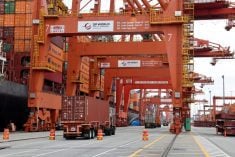A program was officially launched Oct. 8 in an effort to ensure pig transport trucks and trailers are clean and free of disease when re-entering Canada from the United States.
The Western Canadian Swine Transport Wash Program involves audits of commercial and private livestock truck washes that volunteer to participate. The audits are designed to ensure washing, disinfecting and drying sufficient to kill PED and other viruses.
The program was put in place primarily to prevent porcine epidemic diarrhea (PED) virus from spreading via transport trucks that have been in the U.S., where PED is endemic and has killed millions of piglets over the past three years.
Read Also

Canadian trade data delayed by U.S. government shutdown
Canadian international trade data for September will be delayed indefinitely due to the ongoing partial shutdown of the United States government, Statistics Canada said Friday, Oct. 24.
The Canadian Food Inspection Agency served notice this summer that as of Oct. 1, it would enforce existing regulations in the health of animals act requiring trucks to be washed in the United States before they enter Canada.
The move concerned swine producers and agencies because there are relatively few U.S. truck washes and some use recycled water in which PED virus can survive.
Geoff Geddes, communications co-ordinator for Alberta Pork, said the CFIA has undertaken a “soft enforcement” of the regulation since Oct. 1. That involves informing truck drivers of the regulation but not necessarily turning trucks back at the Canada-U.S. border if they haven’t been washed.
“Starting Jan. 13, what they call the informed compliance period will end, and trailers that arrive at the border and haven’t been cleaned and disinfected in accordance with section 106 of the health of animals regulations will be denied entry to Canada, so they’re going to have to go back and get it washed in the States,” said Geddes.
Hog transport companies across the Prairies are now being asked to wash their trucks again on the Canadian side of the border to ensure they are clean.
The CFIA said in communications with Manitoba Pork that it no longer considers PED to constitute and emergency situation, so it cancelled emergency protocols and would enforce existing regulations.
Geddes said Canadian producers continue to view PED is a major threat. Programs in place to test for the virus continue to find positive samples at various locations, though no farms west of Manitoba have been infected.
The new truck wash program is a joint effort of swine organizations in the four western provinces, said Geddes.
Truck wash owners, whether commercial or private, that agree to participate can undergo an audit of their facilities and procedures. Recommendations on improvements will be provided and a follow-up audit will be conducted later. Both will be done at no cost to the truck wash owner.
Provincial pork group websites will list the participating truck washes, though no information on audit findings will be posted, said Geddes.
“The main focus is for benchmarking and to help them either confirm that everything is good … or see if there’s an area that they could work on.”
To date three of Alberta’s seven commercial truck washes have signed up. Numbers in the other provinces were not available.
Washing transport trucks twice – once on the U.S. side and again on the Canadian side – is an expense in time, labour and money, said Geddes.
It can cost $500 to $800 to wash, disinfect and dry a truck and trailer to ensure it is free of viruses.
“Considering the impact of PED and other diseases you can have on the farm, especially from a financial standpoint, we would encourage people to wash them again on our side, to be safe,” Geddes said.
“You really have to look at it in relation to the cost of not doing it.”
Contact barb.glen@producer.com















